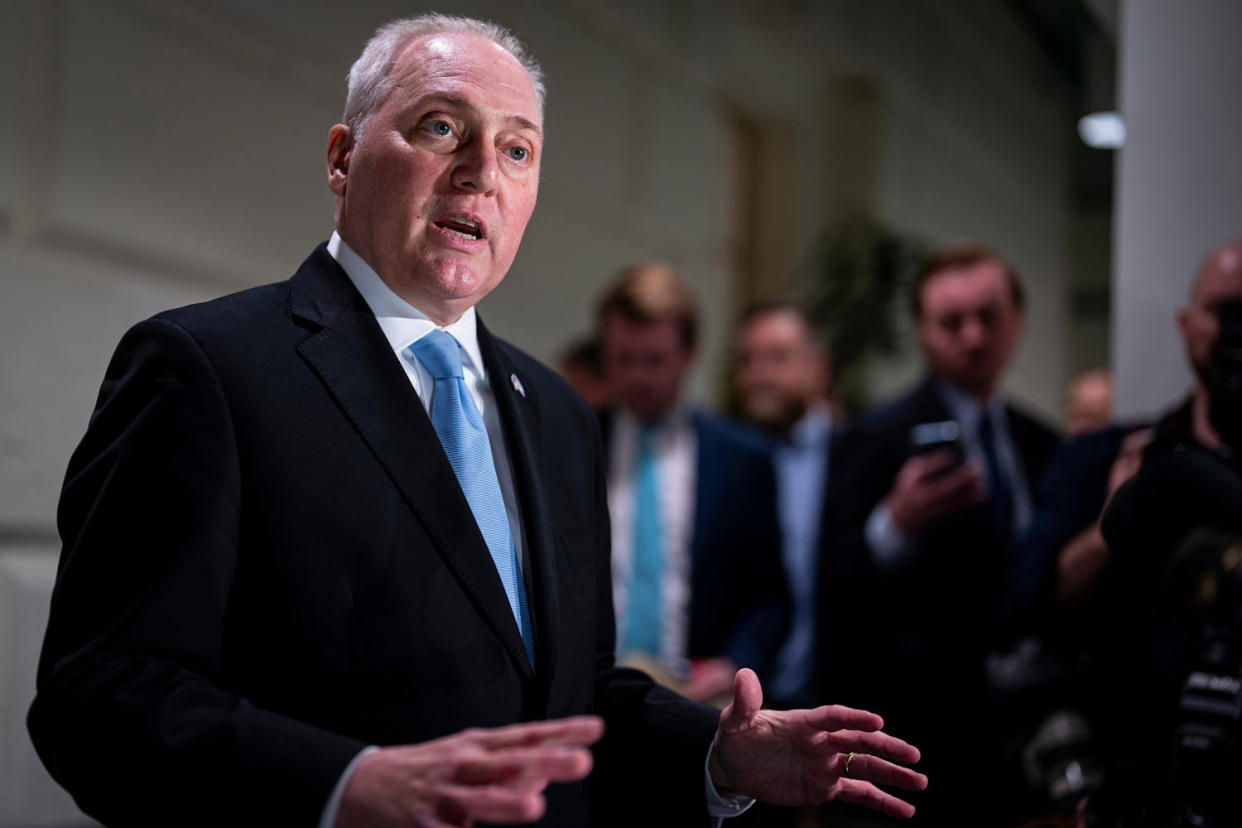Steve Scalise withdraws from speaker's race, sending House into further turmoil
WASHINGTON — Majority Leader Steve Scalise, R-La., informed Republicans in a closed-door meeting Thursday night that he was dropping his bid to be House speaker, one day after he captured the GOP’s nomination for the top job.
Moments later, Scalise, the No. 2 Republican in leadership, confirmed the news to reporters outside the room.
“I just shared with my colleagues that I’m withdrawing my name as candidate for the speaker designee,” he said, adding that he will stay on as majority leader.

"Our conference still has to come together and is not there. There are still some people that have their own agendas," Scalise said. "This House of Representatives needs a speaker, and we need to open up the House again. But clearly, not everybody is there. And there’re still schisms that have to get resolved."
Follow live updates on the House Speaker situation
Republicans nominated Scalise in a secret ballot vote Wednesday to be the majority party’s speaker nominee, defeating Rep. Jim Jordan, R-Ohio, by a vote of 113-99.
His decision to withdraw throws the House into further turmoil, nine days after an unprecedented move by eight Republican rebels to oust former Speaker Kevin McCarthy, R-Calif. It is unclear who can find the votes to unify the fractured — and narrow — majority of 221 House Republicans.
"Complete dysfunction," one Republican lawmaker said after Scalise quit the race.
Moments after Scalise withdrew, Rep. Jim Banks, R-Ind., said Republicans should move forward with Jordan as their choice.
“I voted for Jim Jordan in the conference election yesterday and I remain committed to doing everything I can to help elect him the next Speaker of the House,” Banks said in a statement. “He is a conservative fighter and a leader who can unite our party.”
Many other Republicans, including Reps. Matt Gaetz of Florida, Freedom Caucus Chairman Scott Perry of Pennsylvania and Republican Study Committee Chairman Kevin Hern of Oklahoma, echoed support for Jordan.
But it is unclear whether Jordan, a right-wing firebrand who chairs the Judiciary Committee, could succeed where Scalise failed — getting the 217 votes needed to secure the job.
"HELL NO," Rep. Ann Wagner, R-Mo., wrote in a text message about whether she would back Jordan.
Asked whether she could count five "Never Jordan" votes, Rep. Nicole Malliotakis, R-N.Y., replied: "There's probably five 'Never Everybodys' — that's the problem."
House Republicans will privately huddle again in the Capitol at 10 a.m. Friday to nominate a new candidate for speaker. Jordan dodged questions Thursday night about whether he would launch another bid.
"I think we will come together behind a new candidate, and then we will move forward for the good of the country," he said.

Others, including Majority Whip Tom Emmer, R-Minn., and Speaker Pro Tem Patrick McHenry, R-N.C., also would not say whether they plan to run.
Scalise stunningly withdrew after he held three hours of meetings with GOP detractors and allies and failed to flip any of his critics to the yes column. It became clear at that point that he would not be able to get 217 votes on the House floor.
Because of the GOP’s paper-thin majority, any Republican speaker candidate can afford to lose only four GOP votes; more than a dozen Republicans had come out against Scalise, according to a NBC News analysis.
"It didn't change my mind about how I'm going to vote," Rep. Carlos Gimenez, R-Fla., one of the detractors, said after he met with Scalise on Thursday. "But it was good and constructive. I think there's differences of opinion."
As he left the majority leader’s office Thursday, another Scalise opponent, Rep. Michael Cloud, R-Texas, said, "I don't think the votes are there, and I think we need to get moving on."
Speaking to reporters Thursday night, Scalise declined to say whether he was throwing his support behind another candidate. "I'm not getting involved," he said.
Scalise won over some McCarthy opponents, most notably Gaetz, but failed to flip others. His fate most likely was sealed after he lost support from multiple Republicans who voted to keep McCarthy in the position, including Reps. Marjorie Taylor Greene of Georgia and Lauren Boebert of Colorado.
Rep. Mark Alford, a first term Republican from Missouri, said he is at a loss for what comes next.
“I have no earthly idea. I’m a freshman caught up in this maelstrom. We’re a ship that doesn’t have a rudder right now," he said. "And I’m thoroughly disappointed in the process. And I just pray to God that we find something.”
The 58-year-old Scalise, who was nearly killed in a politically motivated mass shooting in 2017 and now is receiving treatment for blood cancer, said his decision to drop out wouldn't get him down and that he has the "right perspective about life."
"I never came here for a title. ... I’m the majority leader of House. I love the job I have. I’ve had big challenges in my life. I’ve been tested in ways that really put perspective on life," Scalise told reporters.
"Really, the 2017 shooting when I didn’t know if I was going to make it out alive, taught me what’s important in life and that’s my family, my faith, and I’m blessed beyond belief."
